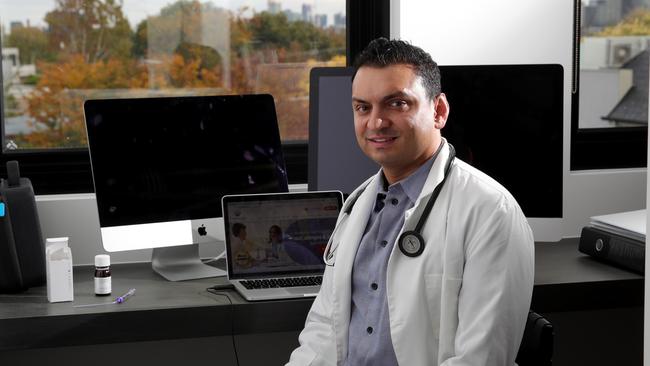Australia the world’s psychedelic research capital as Ingenu studies magic mushrooms and ecstasy
Contract research organisation Ingenu is completing $145m worth of psychedelic drug trials this year as magic mushrooms, ecstasy and special K are catapulted into the mainstream.

Australia is emerging as a leading centre for psychedelic drug trials, an industry with growing interest from venture capital groups.
Melbourne-based Ingenu has secured some $US100m ($145m) in research work alone for 2023 – studying how psychedelics could be used to treat a range of mental health conditions in the hope of spurring a biotech boom that far outstrips the growth in cannabis.
Ingenu is completing clinical trials on behalf of more than 20 companies – including from the US – as the illicit drugs are catapulted into the mainstream to treat depression, anxiety, trauma, pain and even nicotine addiction and eating disorders.
Ingenu – which has set up a research suite between a coin laundry and Shrine of Remembrance – is completing more psychedelic studies for other companies than anywhere else in the world.
The global psychedelic therapeutics market could grow from $US3.6bn to $US8.3bn by 2028, according to estimates published by Insight Ace Analytic.
That growth comes amid increasing research. One paper published in August by the well=regarded JAMA Psychiatry journal found psilocybin – the active ingredient in so-called magic mushrooms – could curb drinking in adults with alcohol use disorder for eight months if used in conjunction with psychotherapy.
Sud Agarwal, Ingenu’s chief executive, said Australia was an appealing research destination, given it offers a more streamlined process than the Food and Drug Administration, while maintaining quality and safety.
“In the US, any new drug that you bring to a human research project, you’ve got to open an IND, which stands for investigational new drug, and that step takes 12-18 months,” he said.
“Australia doesn’t have that. It’s got a very pragmatic approach where you just apply to the ethics committee. If the drug is already well known, like psilocybin or MDMA or ketamine – which are really well studied and have got hundreds of papers – they’re happy to look at the safety data from those papers and say ‘OK, that has been used by 1000 people, it’s probably safe for the doses you are proposing’.
“So you can get those studies off the ground in potentially three months in Australia.”
While a US company still needs to satisfy the FDA, Dr Agarwal said the quality of Australian research is high and recommended.
“Potentially more than a third – even up to 50 per cent – of all clinical research in humans in psychedelics will be performed in Australia. That’s massive,” he said.
Ingenu has built two research suites in Melbourne’s inner southeast. But Dr Agarwal said these rooms look more like spa suites than research laboratories.
“Psychedelics basically need a few things to work. They need the drug to be dosed but then they also need what’s called set and setting,” Dr Agarwal said. “Set refers to mindset and setting refers to the ambient environment. You need a very calm setting … and you need a mindset that’s been prepared, so you typically have your psychotherapy session prior to having a trip to have the maximum effect.”
Dr Agarwal does concede there are some individual risks.
“For example, if you take psilocybin, which is the active ingredient in magic mushrooms, and you have a trip, you can uncover repressed microtraumas that you don’t want to uncover. If you’ve done that without medical supervision and counselling and psychotherapy, you don’t know what the effects would be,” he said.
It is currently running trials for MDMA, ketamine – which is used by anaesthetists and veterinarians – and psilocybin. Like medicinal cannabis, biotechs and other companies are lining up to capitalise on the increasing popularity of psychedelics, considered for psychiatric use decades ago before a US government crackdown.
Some ASX-listed medicinal cannabis companies – including Incannex, Emyria and Creso – have also expanded into psychedelics. Little Green Pharma has also considered the drug, demerging its psychedelic arm, Reset Mind Sciences, last year.
Overseas, psychedelic-assisted therapies groups are already finding support from investors. One, Numinus Wellness, is listed in Toronto and in December applied for a trial of its EnfiniTea product. Its shares, however, are down 72 per cent since it listed in May 2020.
But Dr Agarwal, the former chief medical officer of ASX-listed medical cannabis play Incannex – said companies focused on psychedelics face far stricter regulations than those cannabis companies.
“The major difference was cannabis found a sort of loophole … to start selling direct to the public, even before any drugs were authorised by the FDA and TGA. Psychedelics aren’t (doing that).”




To join the conversation, please log in. Don't have an account? Register
Join the conversation, you are commenting as Logout